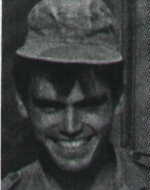Shofet, Assaf
Son of Mordechai and Abigail. He was born on the 5th of Elul 5709 (5.9.1949) in Kibbutz Beit Keshet and was one of the first children born in the kibbutz after the War of Independence. Before his arrival in Assaf for two years, the family decided to move to Giv’at Chen, where he was a cheerful child who hated quarrels and thus took his place among the children of the village and made friends with them. Who was always surrounded by friends and bad friends, was a member of the movement of the moshavim, affiliated with Hanoar Haoved, and he later decided to go to the Mosensohn pre-military school in Magdiel to specialize in electronics studies. And it was hard for him to get used to the life of this pre-military school, because there was a ban on miracles there P home without permission. But since the place was close to home and longings were intense was picked risk sometimes, and popping into “village, albeit briefly. After graduating from there received a technical school in Haifa and the Israel Defense Forces in the school where he felt better. He realized that his studies were useful to him and that when he reached the IDF he could integrate into vital work, since electronics were one of the fastest growing areas, and he was looking forward to the day when he could fulfill his wish. The day after the Six-Day War, Assaf was drafted into the IDF in early June 1967. He did not like the life of the army very much, but he did his duty Faithfully and with infinite devotion. He left the house alert and ready for action. He had not yet reached the base and was already heard in the ranks of the war. After the fighting ended Assaf was sent to serve in Sinai and spent most of his service there. Living conditions in the desert were difficult but he accepted everything with love and hoped that as the war ended, better days would come. From his love for the family and the arms he used every opportunity to visit the house, even though he had to make a long and tiresome journey. During these visits he visited his comrades-in-arms, who lay wounded in the hospitals, or recovered in convalescent homes. Even if the vacation was very short, he did his best to help with the various jobs in his parents ‘farm, and he also visited the grandparents’ home and, in the absence of his parents from the village, managed the farm with great success. In the last few weeks of his service, the parents counted the days until the day of liberation and made plans for the future for him. Both he and Assaf waited impatiently for the upcoming liberation day (he was about to be released about a month after he fell), but that did not prevent him from standing on his right to participate in any combat activity. On April 12, 1970, he fell in the area of the Suez Canal when the enemy shelled his unit’s patrol, and after he got out of the burning half-track, the patrol commander asked if he needed morphine, and he replied, “I do not need this, . In the calm and calm that marked his short life, he bravely bore his pain and torment until he died at midnight. He was laid to rest in the cemetery in Ra’anana. The commander of the unit wrote in a letter of condolence to the parents: “Assaf was one of the outstanding figures in the unit, who was devoted and did far beyond what he was required to do, and he was loved by all of us. Encourage the rest of the armored personnel carriers. His concern was always what would happen to the connection in the unit and the situation at home. “The Hebrew Technion in Haifa also sent the family a letter expressing sorrow and pain for the son’s fall, including:Asaf’s name will not be forgotten, and his name will be forever forgotten among those who gave everything for the freedom and independence of the State of Israel. “After the fall, the parents published a pamphlet bearing his name, “Thanks to a generous donation from Max and Lillian Sharp from Canada, the memory of your son Assaf will be perpetuated by establishing a permanent scholarship fund at the Technion in his name. The Assaf Yoplakana scholarships are offered each year, and their purpose will be to enable the continuation of studies for gifted and underprivileged students. In this Yaffa way, the memory of your son will be commemorated: “In Moshav Giv’at Chen, a cornerstone was laid for a large sports field, to bear his name and the name of another moshav who fell.
